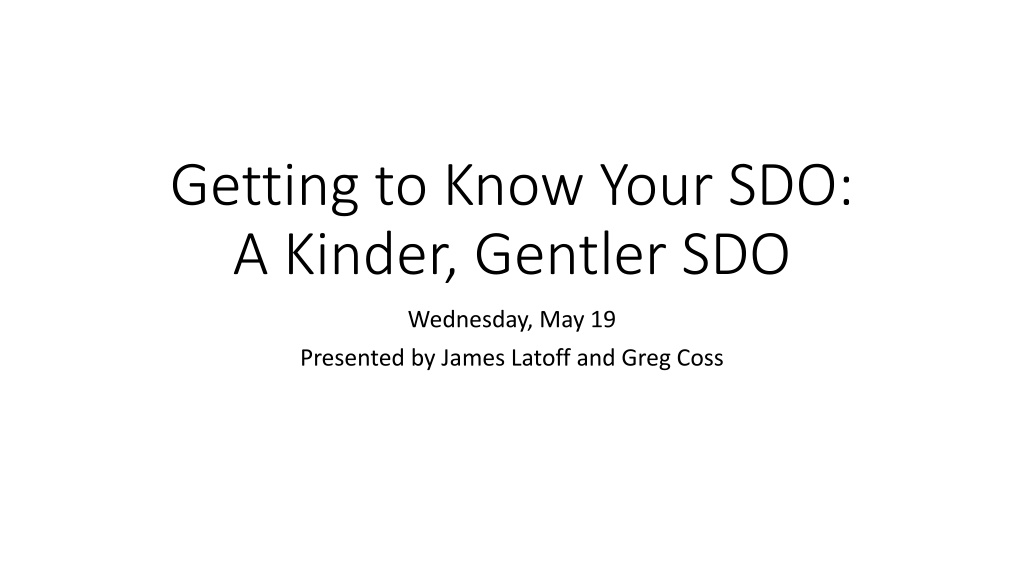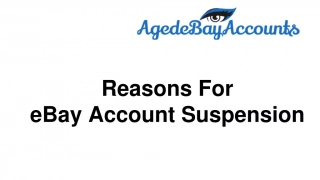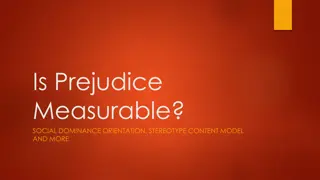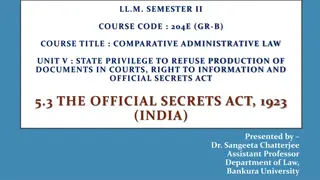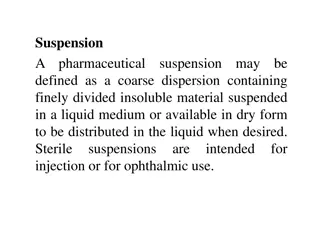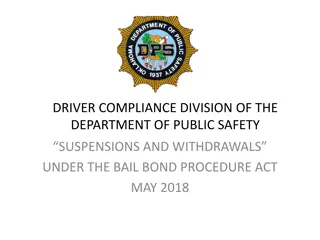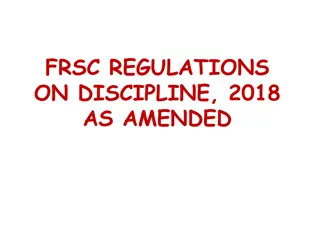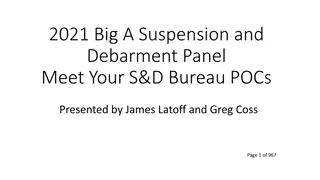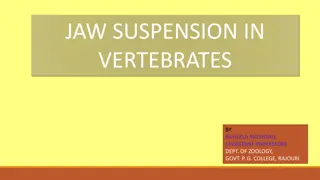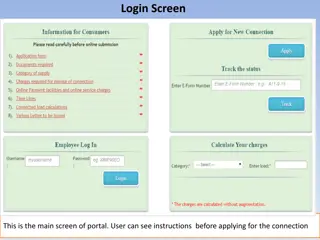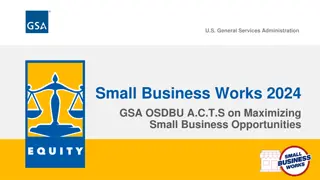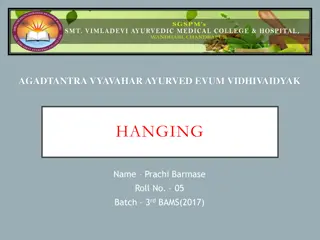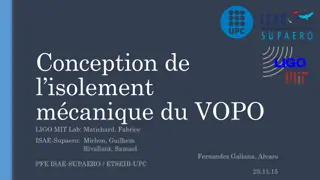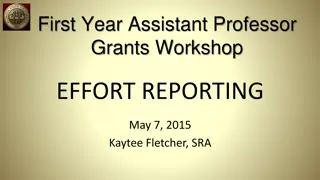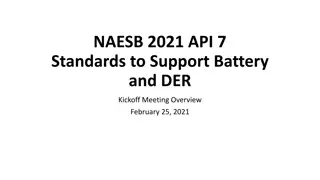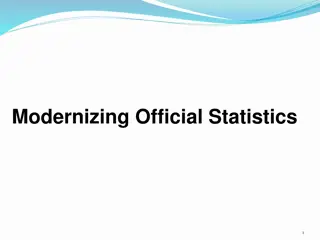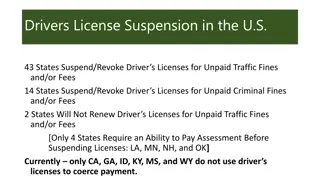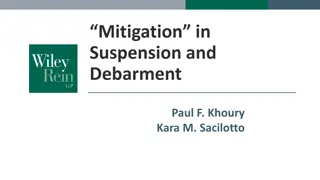Understanding the Role of the Suspension and Debarment Official (SDO)
Explore the key responsibilities of the Suspension and Debarment Official (SDO) within the U.S. Department of Commerce. Discover how the SDO aims to ensure successful grants and contracts, work with responsible parties, and protect the government's financial interests. Learn about the mission to support businesses, empower individuals, and drive economic growth through responsible procurement practices.
Download Presentation

Please find below an Image/Link to download the presentation.
The content on the website is provided AS IS for your information and personal use only. It may not be sold, licensed, or shared on other websites without obtaining consent from the author. Download presentation by click this link. If you encounter any issues during the download, it is possible that the publisher has removed the file from their server.
E N D
Presentation Transcript
Getting to Know Your SDO: A Kinder, Gentler SDO Wednesday, May 19 Presented by James Latoff and Greg Coss
Introduction Olivia Bradley, Deputy for Procurement Management and the Deputy Senior Procurement Executive in the Office of Acquisition Management (OAM) in the Department of Commerce, responsible for the Department s procurement and financial assistance policy, compliance, savings, and systems initiatives. Greg Coss, Suspension & Debarment Coordinator with the Suspension & Debarment Office, and Grants & Cooperative Agreements Specialist with the Financial Assistance Policy and Oversight Division James Latoff, Contractor Responsibility Coordinator with the Suspension & Debarment Office, and Attorney with the Contract Law Division, Office of the General Counsel
Roadmap Where?? (This is should be an easy one). Who? Why? How? What? POCs! Questions? Goodbye!
Where? DOC The goal of the U.S. Department of Commerce is to foster and develop the exchange of goods and services between businesses or entities, both domestically and internationally In order to sustain success in this mission, the DOC must ensure it does business with responsible contractors and financial assistance recipients and help keep them in business By ensuring the DOC works with responsible entities and individuals we will help keep people employed and the DOC receiving quality products, services, and efforts to successfully complete our missions
Who is Responsible? The Suspension and Debarment Official ( SDO ), Mr. Barry Berkowitz, is designated by the Secretary of Commerce with authority to undertake suspension and debarment actions Therefore, Barry makes the final determination on what action will be taken with an entity or individual (known as the respondent ) What s important to remember is that the SDO s mission (and this is the kinder part) is not to punish respondents with a suspension or debarment it is to ensure that the grant or contract succeeds, the DOC does business with responsible parties, non-responsible entities are assisted to become responsible (if possible), and that the government s fiscal interests (i.e., your tax dollars) are protected Barry wants to keep contractors and financial aid recipients working, to keep people employed, and to grow commerce! Our job at Commerce is to grow commerce!
Why? To fight waste, fraud, and abuse by . Ensuring responsible contractors and financial recipients receive our tax dollars Ensuring the awardees and recipients can successfully complete the Bureau s mission Ensuring the Department can successfully complete our mission and support our country Keeping people employed and the economy moving We are custodians of our tax dollars, our mission today, and our country s tomorrow
How Is Success Achieved? Barry wants our projects to succeed, and for awardees to have the option of additional work For this to occur, awardees must be notified when the government suspects there is a problem during an awardee s lifecycle If this notification is through the S&D Office, the awardee (now a respondent) has the ability to put corrective actions in place to remedy the issues they are facing, which improves performance both now and in the future To Barry, success is achieved when non-responsible respondents make changes and become responsible, thereby keeping people working, projects moving, and DOC missions driving What tools are available to the SDO to drive this process?
What are Barrys Tools? Show Cause Letter Request for Information Administrative Agreement Voluntary Exclusion Suspension Debarment
Show Cause Letter Show Cause Letters ( SCLs ) are used by SDOs to provide notice to respondents of serious concerns relating to the respondent s present responsibility and provide an opportunity to respond to the SDO s concerns When an SCL is utilized, there is no immediate exclusion for the respondent SCLs are often utilized when there is sufficient information to establish a cause for exclusion, but the information may be too one- sided or there is concern about the credibility or staleness of the factual record.
Requests for Information (RFIs) Requests for Information ( RFIs ), like SCLs, provide the potential respondent notice of the SDO s concerns and an opportunity to respond SDOs frequently use RFIs when the public record (i.e., a press report) raises concerns about the potential respondent s responsibility but there is no reliable record to perform a responsibility review SCLs and RFIs often clarify the situation and result in establishing a potential respondent s present responsibility without the need for an exclusion However, a potential respondent s failure to respond to an SCL or RFI, or failure to adequately address the concerns raised, may result in an action for exclusion
Administrative Agreement An Administrative Agreement ( AAs ) can arise as a result of a respondent s response to an SCL, suspension, or notice of proposed debarment In essence, it focuses on the trust from the SDO that the respondent will comply with the terms and conditions spelled out in the terms of the AA (ex. ethics or fraud training, working to fix internal controls inside the organization, etc.) It s an excellent example of how Barry does not want to punish contractors and financial aid recipients, but rather help them Effectively, an AA is the SDO giving a respondent a chance to prove responsibility and that they are capable of getting more awards and work from the government
Voluntary Exclusion Voluntary exclusions are essentially voluntary debarments Provide the respondent with the time to get issues remedied and become responsible without the need for debarment Voluntary exclusions appear in SAM. Often, under the terms of an AA, a voluntary exclusion is lifted when the respondent completes all the terms designated in the AA as necessary (i.e., training, etc.) and provides sufficient documentation upon completion
Suspension Temporary ineligibility for an indefinite period of time When there is an immediate need to protect the government from a non- responsible respondent (i.e., indictment) Usually implemented during and through the completion of an investigation or related legal proceeding May not exceed one year with limited exceptions (i.e., legal proceedings) SDOs may suspend a respondent to protect the public s interest based on adequate evidence of the commission of specified crimes (i.e., indictments) Additional reasons an SDO may suspend include other specified misconduct, or the commission of any other offense indicating a lack of business integrity (or business honesty) that seriously and directly affects the present responsibility of a respondent
Debarment An ineligibility for a specific duration of time (not to exceed three years) used to protect the government from non-responsible respondents SDOs may propose respondents for debarment or debar respondents based on a conviction or civil judgment for specified crimes and other misconduct SDOs may also debar contractors and financial aid recipients based upon a preponderance of the evidence for specified conduct, including willful or repeated violations of the terms of a government contract or subcontract, and for any other cause of so serious or compelling a nature that it affects the present responsibility of the respondent If a suspension precedes a debarment, the period of suspension must be deducted from the ordered period of debarment
Complete List of POCs and Email Addresses NIST Todd Hill (todd.hill@nist.gov) Census Brighid Boykin (brighid.boykin@census.gov) PTO Lisa Wade (lisa.wade@uspto.gov) NOAA Rebecca Pedroza (rebecca.pedroza@noaa.gov) *MBDA Nakita Chambers (nchambers@mbda.gov) *ITA Brad Hess (brad.hess@trade.gov) *NTIA Jeff Link (jlink@ntia.gov) EDA William Bethel (wbethel@eda.gov) ES-A Steven McClellan (smcclellan@doc.gov) OGC James Latoff (jlatoff@doc.gov), *Sarah Schwartz (sschwartz@doc.gov) OAM Greg Coss (gcoss1@doc.gov) general questions OIG Hotline 1-800-424-5197 or Hotline@oig.doc.gov MAX Website: https://community.max.gov/pages/viewpage.action?spaceKey=DOC&title=Suspensi on+and+Debarment+Office+of+Acquisiton+Management Contains S&D handbook, last three year s breakout sessions, S&D guidance, fraud indicators, ISDC meeting notes * Grants Only 15
Office of Suspension and Debarment Contact Information suspenddebar@doc.gov (202) 482-5286 Greg Coss (gcoss1@doc.gov) 202-482-3134 James Latoff (jlatoff@doc.gov) 202-322-4112)
Summary: Kinder and Gentler Barry does not want to use suspension or debarment unless necessary Barry wants to work with non-responsible contractors and financial aid recipients to get them to responsible status We need to work together to keep people working! Barry wants to enhance, not detract, from commerce We all work together to get to mission success
